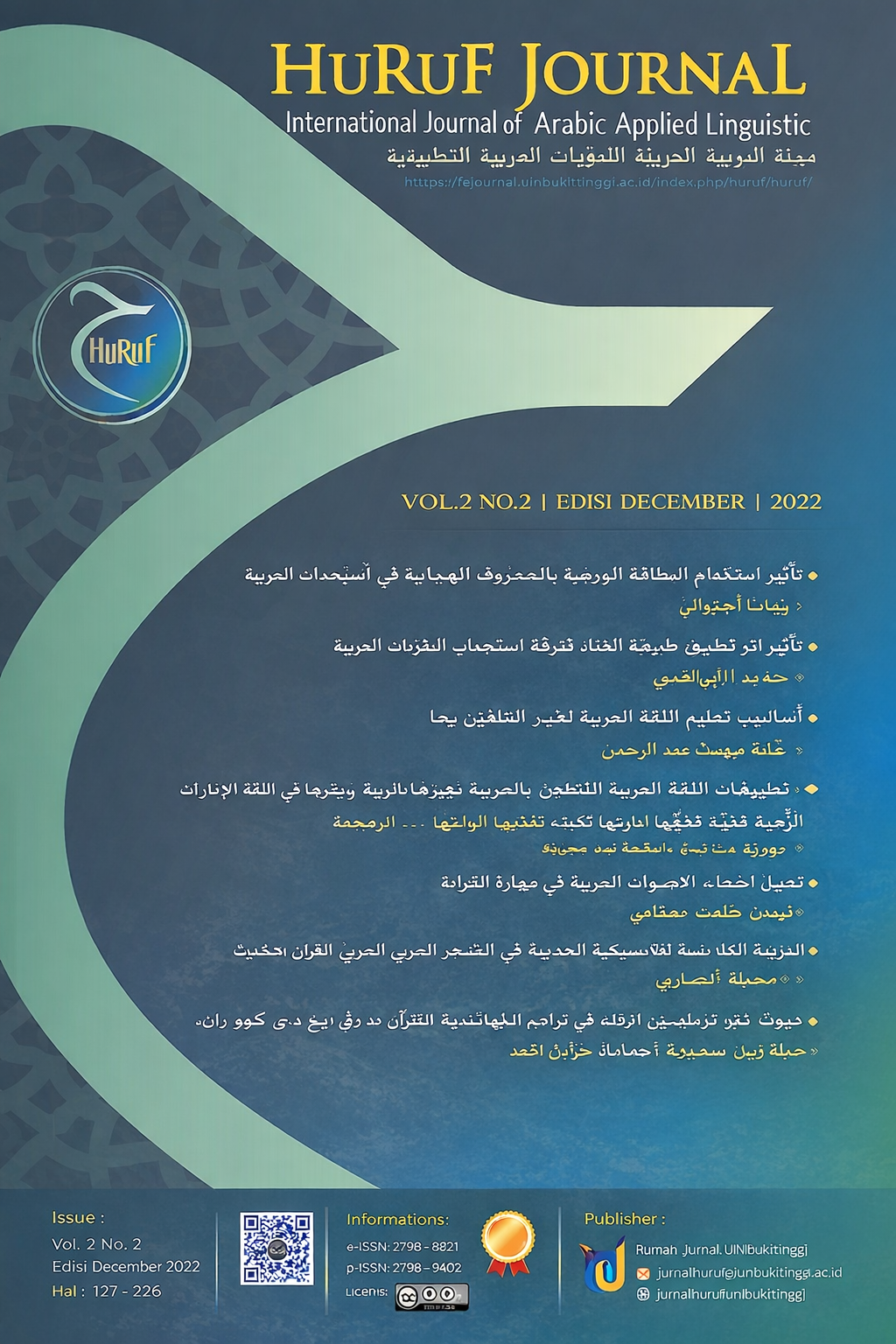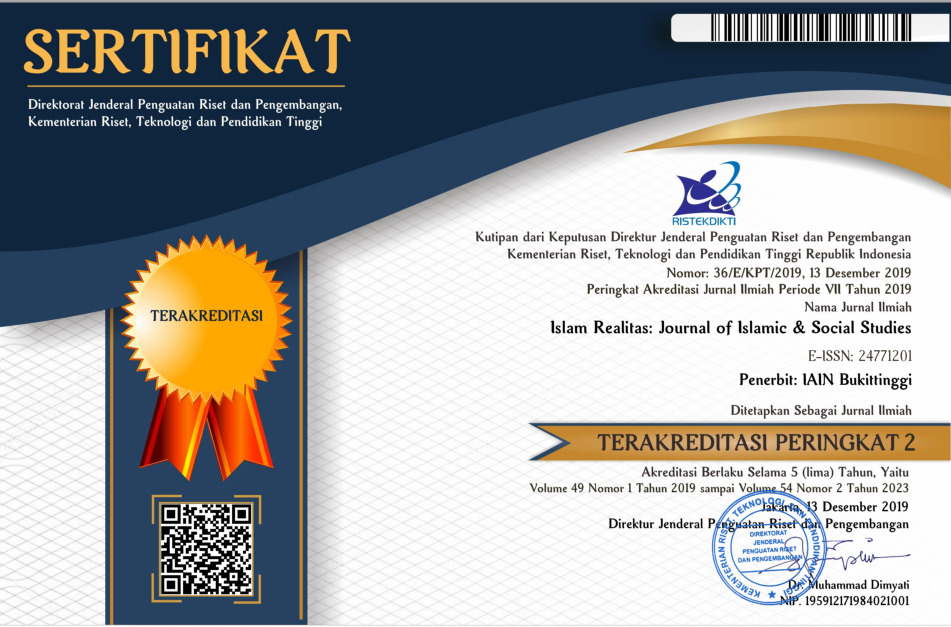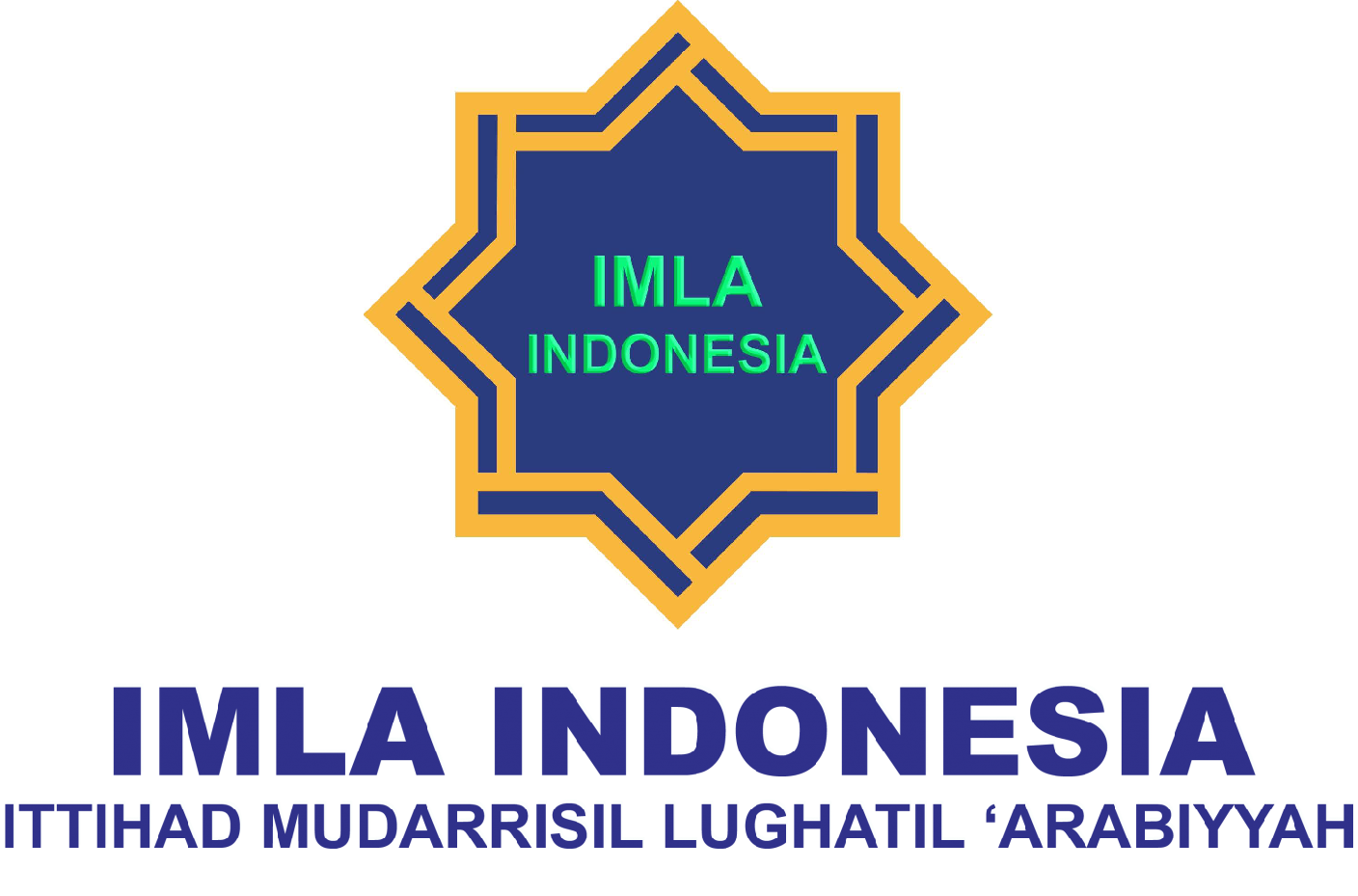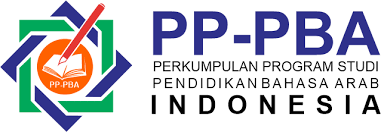TaḥlÄ«l Akhá¹Ä’ al-Aá¹£wÄt al-Ê¿Arabiyyah fÄ« MahÄrah al-QirÄ’ah
DOI:
https://doi.org/10.30983/huruf.v2i2.5780Keywords:
Analyzing the errors of Arabic sound, Reading Skill, ReadingAbstract
This letter was submitted on the topic “Analyzing the Errors of Arabic Sounds in Reading Skill.†The object of this research is the students other than the department of Arabic language education at the state Islamic University of Bukittinggi are not able to pronounce the letters of the convergent sound, and then the department of Arabic language education at the state Islamic university of Bukittinggi, who are not able to pronounce all the alphabets. Then the type of this research is qualitative and descriptive. The data of this research are the result of the recording of students who read Arabic texts, and the data sources for this research are the students of the college of education and educational science, other than the department of teaching Arabic, using the snowball sampling technique. The research results show that the wrong form in reading Arabic texts is the changes in the sound of the analysis of errors. Analysis of student mistakes in the letter ظ becomes the letter ز and ج, the letter Ø·, becomes the letter ت, the letter ض becomes the letter د, the letter Ø« becomes the letter س, Ø´, and the letter Ø° becomes the letter ز, ج, the letter Ø becomes the letter Ù‡, the letter ز becomes the letter س, the letter ع becomes the letter Ø¡, and the letter Ø´ becomes the letter س.
هذه الرسالة قدمت بموضوع "تØليل أخطاء الأصوات العربية ÙÙŠ مهارة القراءة". الهد٠من هذا البØØ« هو الطلاب غير قسم تعليم اللغة العربية بجامعة بوكيت تنجي الإسلامية الØكومية غير القادرين لنطق الØرو٠العربية المتقاربة صوتها Ùˆ غير المستطيعين ÙÙŠ نطق الØرو٠الهجائية كلها. ثم نوع هذا البØØ« هو نوعي Ùˆ وصÙÙŠØŒ Ùˆ بيانات هذا البØØ« هي نتائج تسجيلات أو تسجيلات صوتية للطلاب الذين يقرؤون النصوص العربية، ومصادر البيانات هذا البØØ« هو الطلاب لكلية التربية وعلوم التعليمية التخصوصية لغير قسم تعليم اللغة العربية باستخدام تقنيقية أخذا العينات من كرة الثلج. هذه النتائج تبين أن الشكل الخطأ ÙÙŠ قراءة النصوص العربي هو التغيرات ÙÙŠ صوت الØروÙ. أما الشكل لتØليل الأخطاء يكون ÙÙŠ صوت الØرو٠العربية. تØليل أخطاء الطلاب يكون ÙÙŠ Øر٠الظاء "ظ" ÙŠØµØ¨Ø Øر٠الزاي Ùˆ الجيم "ز،ج"ØŒ ÙˆØر٠الطاء "Ø·" ÙŠØµØ¨Ø Øر٠التاء "ت"ØŒ ÙˆØر٠الضاد "ض" ÙŠØµØ¨Ø Øر٠الدال "د"، وØر٠الثاء "Ø«" ÙŠØµØ¨Ø Øر٠السين Ùˆ الشين "س، Ø´"، وØر٠الذال "Ø°" ÙŠØµØ¨Ø Øر٠الزاي Ùˆ الجيم "ز،ج"ØŒ ÙˆØر٠الخاء "Ø®" ÙŠØµØ¨Ø Øر٠الØاء "Ø"ØŒ ÙˆØر٠الØاء "Ø" ÙŠØµØ¨Ø Øر٠الهاء "Ù‡"ØŒ ÙˆØر٠الزاي "ز" ÙŠØµØ¨Ø Øر٠السين "س"ØŒ ÙˆØر٠العين "ع" ÙŠØµØ¨Ø Øر٠الأل٠"Ø£"ØŒ ÙˆØر٠الشين "Ø´" ÙŠØµØ¨Ø Øر٠السين "س".
References
Al-Qur’anul Karim
Febrianta, Rita, ‘Al-MumÄrasah Al-Ghawiyyah Al-FaÊ¿Älah Wa Ê¿AlÄqatuhÄ Bi Al-I’DÄd Al-Nafs Wa Al-IjtimÄÊ¿ Wa Al-Lughawi’, 2018, 887
Husni, Arman, Al-Madkhal Al-DirÄsah Al-Ê¿Arabiyah (Bukittinggi: IAIN Bukittinggi, 2016)
Sogiyono, Metode Penelitian Kualitatif Kuantitatif Dan R&D
Sudirman, Yogi, ‘Taá¹bÄ«q ṬarÄ«qah TaḥlÄ«l Al-Akhá¹Ä’ FÄ« TaÊ¿lÄ«m Al-InsyÄ’ Al-Ê¿Arabiy Al-TaḥrÄ«riy, MaÊ¿had Al-ImÄn Al-IslÄmiy Li Al-BanÄ«n Ponorogo’, 2014
Yandi, Alfi, ‘TaḥlÄ«l AkhtÄ’ Al-Naḥwiyyah Wa Al-á¹¢arfiyyah FÄ« MahÄrah Al-KitÄbah Li TalÄmidh Al-Faá¹£l Al-KhÄmis Min Madrasah Al-Tarbiyah Al-IslÄmiyyah Candung, Agam’ (JÄmiÊ¿ah Bukittinggi al-IslÄmiyyah al-ḤukÅ«miyyah, 2017)
Downloads
Published
How to Cite
Issue
Section
Citation Check
License
Copyright (c) 2022 Maratun Hamidah, Maratun Hamidah

This work is licensed under a Creative Commons Attribution-ShareAlike 4.0 International License.
Authors who publish with this journal agree to the following terms:
- Authors retain copyright and grant the journal right of first publication with the work simultaneously licensed under a Creative Commons Attribution-ShareAlike 4.0 International Licensethat allows others to share the work with an acknowledgment of the work's authorship and initial publication in this journal.
- Authors are able to enter into separate, additional contractual arrangements for the non-exclusive distribution of the journal's published version of the work (e.g., post it to an institutional repository or publish it in a book), with an acknowledgment of its initial publication in this journal.
- Authors are permitted and encouraged to post their work online (e.g., in institutional repositories or on their website) prior to and during the submission process, as it can lead to productive exchanges, as well as earlier and greater citation of published work (See The Effect of Open Access).





